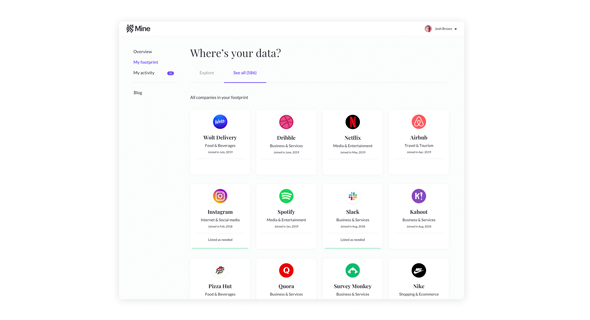Attempting a ‘data detox’ in today’s digital world
Using Mine’s platform, I tried to reclaim my data spread across hundreds of websites over 10 years
In the last few years, there has been a reckoning among us internet users. No longer are we accepting that companies can request, store, and sell our information for the purpose to serve us ads and keep us glued to their platforms. Recent documentaries such as ‘The Great Hack’ and ‘The Social Dilemma’ have only heightened our knowledge of how nefarious it can be when our online identities are exploited, and it’s time we take back control of that information spread across the corners of the internet.
Enter Mine. The company has provided an AI-based solution to help users ‘reclaim’ their data from sites that store email addresses or personal information that are at risk of being hacked. Don’t think Facebook or Google, but rather the youth hostel you stayed at in 2011 or the restaurant you took your first date to in college. By ironically granting it access to the subject lines of the emails in your inbox, the company can show you roughly 90% of places that store your data on their servers, 85% of these due to a one-time interaction you had with them.
 Gal Ringel, CEO & co-founder of Mine. Photo: Gal Ringel
Gal Ringel, CEO & co-founder of Mine. Photo: Gal Ringel “We're not trying to remove your footprint from the internet entirely,” explained its Co-Founder and CEO Gal Ringel. “We want to help you enjoy it and keep your data in places where you’re still getting value and remove it from all the other places.”
Ahead of speaking to Ringel, I decided to try it out myself. After only a few seconds, Mine’s consumer-facing product identified 362 companies or websites that had my personal information on file. Of course, the large companies were there which I expected and accepted, but so were some that I had no memory of ever interacting with. Twelve of them were from the month of July when I visited London and sacrificed a lot of privacy for the sweet use of wifi in public locations or in restaurants that were calling for Covid-based accountability in case of an exposure.
Mine’s dashboard shows you where your data is currently being held and is divided into three areas: how much you’re using the service, the type of data it keeps, and the risk levels due to data breaches or privacy scandals associated with that company based on public news or information found on the dark web.
“We show you all the data objectively,” Ringel said. “We show you which companies have your data and insights around that, but you make the decision whether you want to remove them or not based on the value you receive from their service.” I decided that 100 of the companies - at least initially - were not worthy of my email address and easily clicked on each company. By clicking ‘reclaim’, I could send an automated email to the company requesting they remove me from their memory. It is then their responsibility by law to abide by my request.
This obligation to my request is made possible due to GDPR and CCPA, two laws coming from the EU and USA that give data ownership back to the internet user. According to Ringel, GDPR “changed the history of the internet” because it defined data as our own asset and gave us the right to be forgotten. These laws that protect our digital footprints exist in the European Union, Canada, Australia, India, Japan, Argentina, Brazil, and four U.S states.
“We are not working on your behalf,” Ringel explained, citing the terms of use for Mine. “We put you in front of the company. I'm not taking a legal power of attorney and reaching out to the companies as it was you. We operate within your inbox as your smart data assistant but we put you in front of the company. Mine is not a third party in the process.”
- Three things they didn’t tell you in Netflix’s ‘The Social Dilemma’
- Big Brother is coming for your data: The Bank of Israel demands to know what you’re buying
- Using data to drive business
I told Ringel that I had identified 100 companies using Mine and chose to reclaim my data from them. He told me that the average person is sharing his or her data with 350 companies and usually, the first round of reclaims comes to about 35. According to him, the companies would then respond to me giving me an update on the status of their deletion efforts.
And boy, did they. The next day I received roughly 30 emails in a two-minute window from companies that had acknowledged my request to be forgotten. Some were automated and some were personal, and yet they all came in at once suggesting that Mine’s process also controls the responses of each company as well as the output of the initial request. It was almost overwhelming and yet each one triggered my dopamine levels - similar to the feeling of unsubscribing from email newsletters.
Today, Mine has been used by 350,000 data-wary users who have sent five million deletion requests to companies around the world. Amazingly, those 350,000 users have contacted 300,000 companies. Ringel told me that a single data subject access request (DSAR) and deletion request can cost a company $1,400. This is due to the aggregated total time of the support person, the legal person, and the R&D engineer who needs to go into the database and manually delete information off the servers.
 An example of Mine's dashboard. Photo: Mine
An example of Mine's dashboard. Photo: Mine Mine’s product is free for people like me and other internet users who wish to delete their data. However, their business model relies on helping these companies execute the time-consuming and expensive requests that are coming in. By law, GDPR demands 30 days and CCPA demand 45 days for companies to complete the action, but by signing up to Mine they can automatically find, collect, and delete user data in a matter of seconds. Mine charges companies $300-$1,500 per month depending on the data integrations the company has and one day hopes to offer a freemium package for consumers to automate the incessant replies that come into your inbox. Which, speaking from experience, would be a welcomed tool worth the money.
“We are leveraging the regulations, both for consumers and companies,” Ringel told me. “Essentially our mission is to create a better experience for exercising rights on the consumer side but for companies to handle these requests in a faster way. That helps them elevate the brand trust... companies understand that if they value privacy, they will gain more loyalty from their customers.”
- In today’s data-driven world, “privacy is a marketing tool”
- “It is crucial to social networks to keep the content on the network safe for the users ... doing this manually is impossible”
- WhatsApp’s new privacy settings Signal change for instant messaging
Of course, there’s irony in the fact that the very companies that are trying to build trust by complying with these requests are the very ones that are in the process of losing me as a customer. However, knowing that my data is in fewer places today than it was last week helps me sleep a little better. Facebook still knows my favorite movies and Amazon knows what I want for my birthday, but based on what Mine showed me, my information is safer because my data footprint is smaller and at a lesser risk of getting stolen by hackers.
“We are really here to bridge the gap between consumers and companies around their privacy experience,” Ringel concluded. “So consumers can understand where their data is and what it means and remove it… And for companies, since it’s hard to manage these requests, to make their life easier and then to connect consumers and companies around a better experience.”
Mine wouldn’t tell me how many companies are using their product, but Ringel confirmed that it already has “an Israeli consumer unicorn worth more than $1 billion” as one of its customers. It started monetizing a few weeks ago and expects more people to send more deletion requests, pushing companies to deploy Mine’s platform to help handle the work. To date, it has received $12.5 million in funding with its most recent Series A occurring in October 2020.



